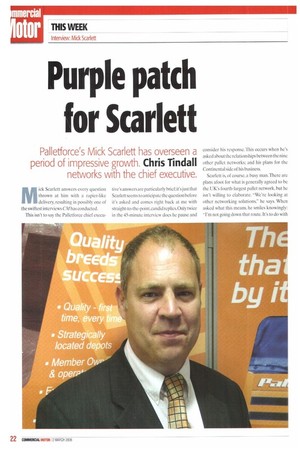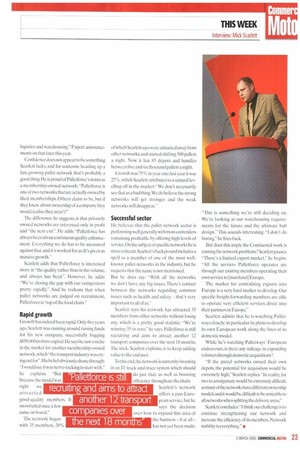Purple patch for Scarlett
Page 22

Page 23

If you've noticed an error in this article please click here to report it so we can fix it.
Palletforceis Vick Scarlett has overseen a
period of impressive growth. Chris Tindall
networks with the chief executive.
Mick Scarlett answers every question thrown at him with a rapier-like delivery, resulting in possibly one of the swiftest interviews CM has conducted.
This isn't to say the Palletforce chief execu tive's answers are particularly brief; it's just that Scarlett seems to anticipate the question before it's asked and comes right back at me with straight-to-the-point,candid replies.Only twice in the 45-minute interview does he pause and consider his response:Ibis occurs when he's asked about the relationships between the nine other pallet networks; and his plans for the Continental side of his business.
Scarlett is, of course, a busy man. There are plans afoot for what is generally agreed to be the UK's fourth-largest pallet network, hut he isn't willing to elaborate. "We're looking at other networking solutions." he says. When asked what this means, he smiles knowingly: "I'm not going down that route. It's to do with logistics and warehousing." Expect announcements on that later this year.
Confidence does not appear to be something Scarlett lacks, and for someone heading up a fast-growing pallet network that's probably a good thing. He is proud of Palletforce 's status as a membership-owned network: "Palletforce is one of two networks that are actually owned by their memberships. Others claim to be, but if they knew about ownership of a company they would realise they aren't!"
The difference, he suggests, is that privately owned networks are interested only in profit and "the next exit". He adds: "Palletforce has always been about continuous quality enhancement. Everything we do has to be measured against that. and it's worked for us. It's given us massive growth."
Scarlett adds that Palletforce is interested more in "the quality rather than in the volume, and always has been". However, he adds: "We're closing the gap with our competitors pretty rapidly." And he reckons that when pallet networks are judged on recruitment, Palletforce is "top of the food chain."
Rapid growth Growth has indeed been rapid. Only five years ago. Scarlett was running around raising funds for his new company, successfully bagging i650,000 in share capital. lie says he saw a niche in the market for another membership-owned network, which "the transport industry was crying out for". His belief obviously shone through: "I would say it was nerve-racking to start with," he explains. "But because the model was right we at good-quality members. It snowballed once a few came on board."
The network began with 35 members, 20% of which Scarlett says were attracted away from other networks, and started shifting 500 pallets a night. Now it has 85 depots and handles between five and six thousand pallets a night.
Growth was 75% in year one: last year it was 25%, which Scarlett attributes to a natural levelling off in the market: "We don't necessarily see that as a had thing.We do believe the strong networks will get stronger and the weak networks will disappear."
Successful sector He believes that the pallet network sector is performing well generally with most contenders remaining profitable by offering high levels of service, On the subject of specific networks he is more reticent. Scarlett's background includes a spell as a member of one of the most wellknown pallet networks in the industry, but he requests that the name is not mentioned.
But he does say: "With all the networks, we don't have any big issues. There's contact between the networks regarding common issues such as health and safety — that's very important to all of us."
Scarlett says his network has attracted 35 members from other networks without losing any, which is a pretty good statistic: "We're winning 35 to zero," he says. Palletforce is still recruiting and aims to attract another 12 transport companies over the next 18 months. The trick, Scarlett explains, is to keep adding value to the end user.
To this end,the network is currently investing in an IT track-and-trace system which should do just that. as well as boosting efficiency throughout the chain. Scarlett's network offers a pan-European service, but he says the decision over how to expand this area of the business — if at all — has not yet been made:
anot er 12 transport
"Ibis is something we're still deciding on. We're looking at our warehousing requirements for the future and the ultimate huh design." This sounds interesting. "I don't do boring," he fires back.
But does this imply the Continental work is causing the network problems? Scarlett pauses. "There's a limited export market," he begins. "All the services Palletforce operates are through our existing members operating their own service to [mainland] Europe.
The market for centralising exports into Europe is a very hard market to develop. Our specific freight-forwarding members are able to operate very efficient services direct into their partners in Europe."
Scarlett admits that he is watching Palletways closely; in particular its plans to develop its own European work along the lines of its domestic model.
While he's watching Palletways' European endeavours, is there any mileage in expanding volumes through domestic acquisitions?
"If the parcel networks owned their own depots, the potential for acquisition would be extremely high," Scarlett replies. "In reality, for two to amalgamate would be extremely difficult, as many of the networks have different ownership models and it would be difficult to be amicable to all networks when splitting the delivery areas."
Scarlett concludes:"1 think our challenge is to continue strengthening our network and increase the efficiency of its members. Network stability is everything."
















































































































































































































